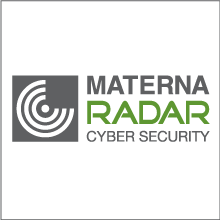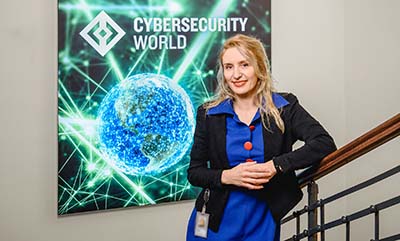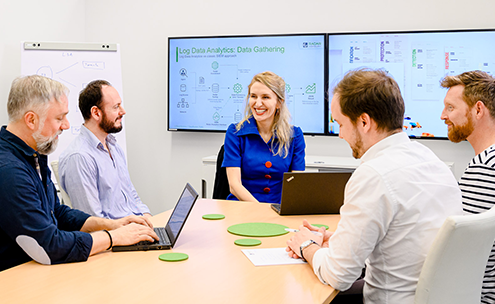Agile Coach Nihada depicts her challenging role at Radar Cyber Security and the relocation to Austria.
How was it to relocate to Austria for work?
I moved to Vienna 4 years ago. At the time, it was for another job, but I changed and joined Radar Cyber Security.
Working for the company and spending time with its brilliant people, but also living and working in Austria is a huge privilege which I am aware of every day. This should be a shared feeling of every person living here, not only foreigners. The city of Vienna is wonderful and I constantly discover new reasons for loving it!
What does an Agile Coach do?
We manage and optimize processes which bring long-term sustainability and increase efficiency. We implement useful practices which make an environment more professional and more appealing to work in. Our role is advisory and our success is always dependent on all colleagues involved. That is why team spirit is something to nurture and insist on.
Complex projects imply complex workflows. There are frameworks suitable for handling that complexity. Sometimes it’s enough to choose one, but mostly it’s about combining methods and practices in order to create a custom solution, because each project and each company have their own specific challenges. It’s not always easy to achieve an ideal setting: on the one side, I have to persuade decision makers that it’s the right approach. On the other side, I have to make sure my colleagues recognize the benefit of changes. It often means dealing with emotions.
What is the best about your job?
My colleagues come from all over the world, but they share one mutual characteristic: the ability of complex problemsolving and deep thinking. How could I not admire that?
The technology produced at Radar Cyber Security is a compound set of tools. Even its users possess a high level of technical knowledge – imagine how challenging it is to develop such tools! Their knowledge and commitment are the things I admire my colleagues for. What I also like about them, is their playful approach to work (and life).
I am often reminded of Jostein Gaarder’s thought: “The only thing that we require to be good philosophers is the faculty of wonder.” In some professions, one really needs to ask themselves more questions than a child would do. I would describe my job as a clash between being in an episode of “The Big Bang Theory” and a feeling of enormous and very serious responsibility towards reaching project goals.
What does a typical workday look like for you?
Agile coaches are there to help people organize and plan their work, but we can hardly predict our own. There is always something that surprises me at work. That is because my job covers many different types of tasks: from advisory to organizational ones, from removing impediments to resolving conflicts, from teaching others to always being open-minded to learn from them and rethinking solutions to enable continuous improvement. That dynamic is exactly what I appreciate about my job and I truly believe this job is perfect for me, just as I am perfect for this job.
Of course, process framework implementation is a project like any other and it has different phases: analysis, planning, implementation, maintenance. Depending on which phase the team or project is in, my main tasks can differ. I always plan my day with offering the maximum availability to my teams.
Would you agree that working conditions for developers became more complex and demanding? How do you find conditions at Radar Cyber Security?
I would say that developers are facing the constant challenge to communicate. That may sound simple, but often does not come naturally: It’s not about any form of communication, but requires a structured, planned, analytical and an official one. If software depends on one person, its value is fragile and unreliable. As a consequence: if developers want to be a part of big and exciting engineering projects, they need to become team players. They need to be part of a professional environment. That can be quite complex to accept.
Embracing complexity is not only a cognitive challenge, but also an emotional one. When we deal with anger and fear, we become overly reactive and are not capable of reflection. That is why it is important to achieve absolute transparency and to create a safe environment for each person involved. This requires constant effort and dedication of agile practitioners.



